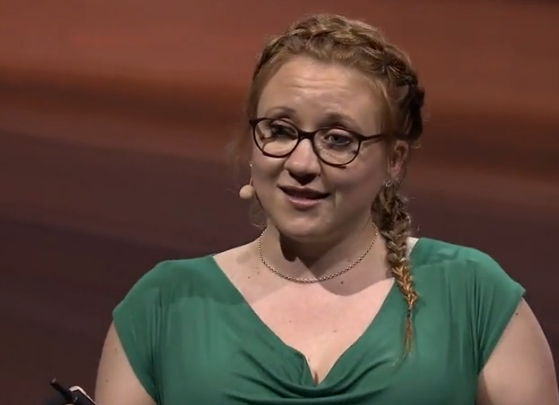I realized then that we had to think deeply about how the technology we work on today looks in five years, in 10 years.
那时我了解到,我们必须要深入思考我们现今努力发展的科技,在五年、十年后会是什么样子。
Humans evolve slowly, with time to correct for issues in the interaction of humans and their environment.
人类演进很慢,有时间可以去修正在人类互动以及其环境中的议题。
In contrast, artificial intelligence is evolving at an incredibly fast rate.
相对的,人工智能的演进速度非常快。
And that means that it really matters that we think about this carefully right now
那就意味着,很重要的是我们现在要如何仔细思考这件事,
that we reflect on our own blind spots, our own biases,
我们要反省我们自己的盲点,我们自己的偏见,
and think about how that's informing the technology we're creating and discuss what the technology of today will mean for tomorrow.
并想想它们带给我们所创造出的科技什么样的信息,并讨论现今的科技在将来代表的是什么含义。
CEOs and scientists have weighed in on what they think the artificial intelligence technology of the future will be.
对于未来的人工智能应该是什么样子,首席执行官和科学家的意见是很有份量的。
Stephen Hawking warns that "Artificial intelligence could end mankind."
史蒂芬·霍金警告过:“人工智能可能终结人类。”
Elon Musk warns that it's an existential risk and one of the greatest risks that we face as a civilization.
伊隆·马斯克警告过,它是个生存风险,也是我们人类文明所面临最大的风险之一。

Bill Gates has made the point, "I don't understand why people aren't more concerned."
比尔·盖兹有个论点:“我不了解为什么人们不更关心一点。”
But these views -- they're part of the story.
但这些看法--它们是故事的一部分。
The math, the models, the basic building blocks of artificial intelligence are something that we call access and all work with.
数学、模型、人工智能的基础材料,是我们所有人都能够取得并使用的。
We have open-source tools for machine learning and intelligence that we can contribute to.
我们有机器学习和智慧用的开放原始码工具,我们都能对其做出贡献。
And beyond that, we can share our experience.
在那之外,我们可以分享我们的经验。
We can share our experiences with technology and how it concerns us and how it excites us.
分享关于科技、它如何影响我们、它如何让我们兴奋的经验。
We can discuss what we love.
我们可以讨论我们所爱的。
We can communicate with foresight about the aspects of technology that could be more beneficial or could be more problematic over time.
我们能带着远见来交流,谈谈关于科技有哪些面向,随着时间发展可能可以更有帮助,或可能产生问题。



